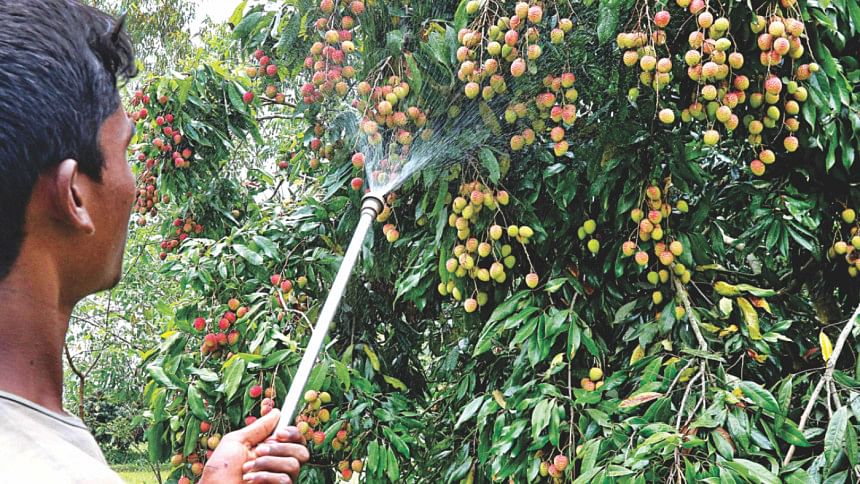Litchis not that safe

Last month, we ran a report on the bumper production of summer fruits and the government measures to check contamination of the produce. The report contained some encouraging developments. Recently, our correspondents visited different areas in the north to know about the situation on the ground. Today's report is on our findings on litchis.
The extent and incidence of applying pesticide on litchis in two Dinajpur upazilas looks alarming this year in the absence of government monitoring.
Following media reports for the past few years that farmers use excessive pesticides and harmful ripening agents on summer fruits, the government this season took some measures, however inadequate, to check it.
But talking to about a dozen litchi growers in Dinajpur Sadar and Biral upazilas, it was found that there is no programme or monitoring mechanism to prevent unnecessary use of insecticide, growth hormone and ripening agent on this fruit.
"I sprayed insecticide only yesterday [last week]," said Abdul Aziz Sarkar of Auliapur in Dinajpur Sadar while plucking litchis at his orchard.
Aziz is happy to have spent around Tk 40,000 on fertiliser and pesticide for his 42 litchi trees. The yield is high and he has made about Tk 2 lakh from the sale already.
From flowering to harvest, the permissible limit of spraying pesticide is three times, according to agro officials.
But Aziz, 50 years a litchi farmer, applied it around 20 times. For him, protecting his fruits from pest attack is all; he does not know the doses or the harmful effect of chemicals on health.
"Insects are increasing every year and we need to spray insecticide and medicine [hormone] at least once in every two weeks. I eat litchis on the day I apply pesticide. It is not harmful at all to our health," he said.

CRACKS ON LITCHI SKIN
During a recent visit to an orchard at Maheshpur village of Biral upazila, The Daily Star found two workers using chemical on litchi. They said they usually sprayed insecticide once a week and even more when it rained.
Thanks to the overuse of growth hormones, the litchis in their orchard have grown so big that cracks have developed on the skins of most litchis.
"It happened because of the overuse of medicine [growth hormone]," said Obaidul, one of the workers, showing cracks on China-3 litchis in a tree.
Alarmingly, Obaidul could not even tell the name of the pesticide he was applying. He has no idea about its doses either.
Most of the time farmers rely on the advice of pesticide dealers who always push for maximising their sale. As a result, sale of pesticides and growth hormones shoot up during fruit season, agro officials say.
"We record the maximum sale of pesticides during the fruit season. It goes up by up to 60 percent during this time," said Abdur Rashid, a pesticide seller from the Cheradengi area of Dinajpur town.
CAUSE FOR CONCERN
Bangladesh Agricultural Research Institute (BARI) has been examining seasonal fruits and found high quantity of pesticide like Organophosphorus in the sample.
"We have detected pesticides in 14 percent sample of litchis that came from Dinajpur [this season]," said Syed Nurul Alam, chief scientific officer of BARI.
Farmers do not need to use Organophosphorus on litchis, but they still do it on instructions of pesticide dealers, he said, adding that chemical residues remain in fruits for 10 to 12 days after application.
Experts say consumption of pesticide-contaminated fruits could cause serious diseases, including cancer, and damage kidney.
According to the Department of Horticulture, Dinajpur is growing litchis on 4,100 hectares land, compared to 3,100 hectares last year.
Production in the district is expected to be 30,000 tonnes, about 15 percent of the country's total production.
Asked about control and regulation, Imrul Ali of Dinajpur horticulture centre said they offered advice when farmers visited the centre and sought help.
"But we do not have any fund to visit their orchards or undertake monitoring programmes," he told The Daily Star.
In June 2012, 14 children aged between two to 16 died in Dinajpur and Thakurgaon several days after eating litchis.
The Institute of Epidemiology, Disease Control and Research (IEDCR) suspected that the litchis were contaminated.
For confirmation, the IEDCR later sent to the US samples of blood and urine of children who had similar symptoms. The test found traces of pesticides in the blood and urine.

 For all latest news, follow The Daily Star's Google News channel.
For all latest news, follow The Daily Star's Google News channel. 



Comments